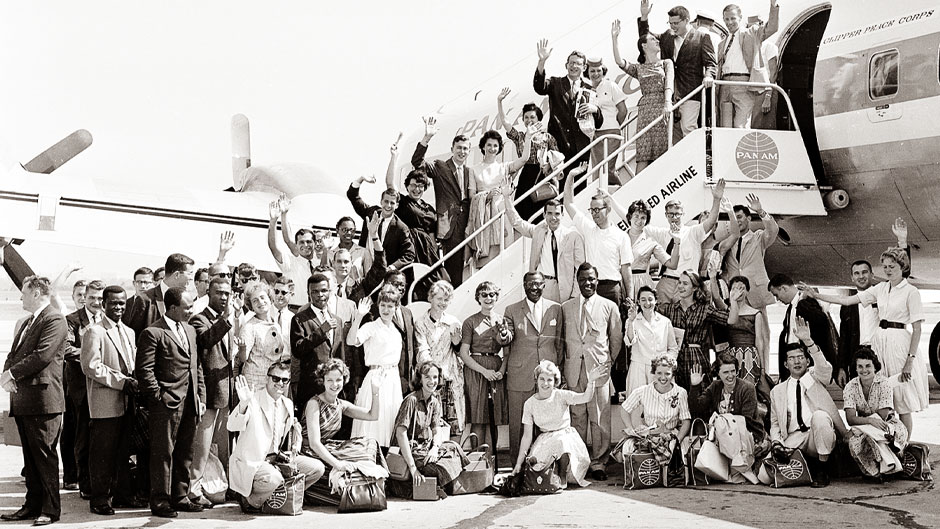On Monday, March 1, the Peace Corps commemorates 60 years since President John F. Kennedy established the agency. Over the last six decades, Peace Corps volunteers have worked in 60 countries promoting peace and friendship through volunteerism and public service.
In honor of the milestone, the Master of Arts in International Administration (MAIA) and Master of Science in Education (M.S.Ed.) in Community and Social Change programs will host two virtual panel discussions.
With introductory remarks from President Julio Frenk, the first forum will be moderated by Bradford McGuinn, director of the MAIA program in the College of Arts and Sciences. The discussion will take place at 4:30 p.m. on Monday, March 1, and feature Douglas Neese, assistant director of the Toppel Career Center; Mariah Schuemann, a lecturer in the Intensive English Program; and Felicia Casanova, a Ph.D. student studying sociology—all members of the University community who have volunteered with the Peace Corps. The panelists will discuss the University's continued involvement with the agency and share their view about service. Maryann Tobin, assistant dean for professional education in the College of Arts and Sciences, helped coordinate the event.
“The University has a long, rich history with the Peace Corps. Several alumni have gone on to serve and work with them. I’m looking forward to hearing what the panelists have to share about their experiences,” Tobin said. “Our MAIA program and the School of Education and Human Development’s M.S.Ed. program are focused on developing public servants who can work on both local and global scales, and quite a few graduates have gone on to volunteer and work in remote parts of the world as part of the Peace Corps.”
Tobin said she hopes the panels will raise awareness of Peace Corps programs and encourage students and members of the University community to volunteer in the future, especially following the COVID-19 pandemic.
On Wednesday, April 21, in a follow-up event, the MAIA program will host another virtual forum highlighting the Peace Corps’ mass repatriation of volunteers during the pandemic. Donna Shalala, a former congresswoman and former University of Miami president who was among the first volunteers in the Peace Corps, and Carol Bellamy, former director of the Peace Corps, will be guest speakers.
When the COVID-19 pandemic hit in March 2020, the Peace Corps brought more than 6,000 volunteers home to the United States within seven days.
“Everyone who was serving had to pack up and go home. All our volunteers ended their service in March 2020,” said Taylor Majher, the regional recruiter for the Peace Corps, who was serving in Guatemala. “The Peace Corps, as an agency, has still been working. As recruiters, we are still talking with people who are interested in applying and sharing our experiences. We're still spreading our mission of world peace and friendship, even while back home,” she added.
Majher will deliver an overview and brief history of the Peace Corps during the discussion on March 1. As a recruiter in South Florida, she works closely with University students and recent graduates interested in volunteering for the agency. “We are proud to say that from our last available report, the University of Miami is ranked number 16 among medium size universities, with alumni who served in the Peace Corps,” Majher said.
Since the Peace Corps’ founding, 462 University students or alumni have volunteered with the agency, serving within a wide variety of specialties.
Ragan Sawyer, a M.S.Ed. student, returned from Peace Corps service in 2019. After spending years in the Philippines as a six-grade-elementary-education volunteer, Sawyer said her Peace Corps network enriched her career path and set her up for success academically.
“In my time in the Peace Corps, I developed an understanding of participatory action. Listening to the community I was serving and evaluating what their needs were has been extremely relevant to my studies and my career,” she pointed out. “Just the community of other Peace Corps volunteers at every level has been a massive support to my future.”
“As the Peace Corps celebrates our 60th anniversary, I am reminded of how far we have come and what an unprecedented time we are in now,” Carol Spahn, acting director of the Peace Corps, shared in a statement ahead of the occasion. “The past 60 years have truly prepared us for this historic moment. During a pandemic that has touched every corner of the globe, it’s clear that we are all in this together,” she wrote. “As we look to the next 60 years, I know the Peace Corps will continue to be a community of people—all over the world—willing to do the hard work of promoting peace and friendship.”
Anyone interested in attending the virtual panel at 4:30 p.m. on Monday, March 1, can register here. Visit maia.miami.edu for additional information on the April 21 event.

